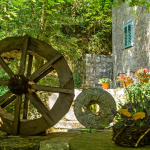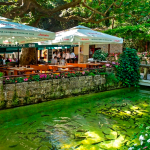There is only one wine producer in Croatia making only two very rare and appreciated wine types, ice harvest and election harvest of dried grapes. It is the famous Boris Drenški, known to many as Bodren, a combination of the first letters of his name. This is how Boris named his winery and since he was unknown before, the winery name became a synonym for him. From complete anonymity to star status for him and his wines took only a year, Jutarnji List published on December 12, 2016.
In the already historical 2008, the hobby winemaker from the border village of Rusnica near Hum na Sutli sent his sweet predicates rich in playful acids in their trial phase to the most popular wine competition in the world, organised by the Decanter magazine in London. Predicates or predicate wines are wines made from grapes harvested after the usual harvest time and whose must before fermentation contains sugar levels above the minimums in its category. Titles of categories are set by rising sugar levels, from the late harvest with the least sugars in must of all predicates, but more than in wines of regular harvest, through election harvest, then election harvest of berries, then ice harvest and finally election harvest of dried berries. Bodren’s predicates are marked by a unique characteristic especially valued in predicate wines. It is the perfect balance between sweetness and acidity.
Other virtues are also present, like the widest palette of aromas starting from glazed fruit, to noble mould, dried fruit, marmalade and honey, dried and fresh flowers and many others. However, these virtues are part of a large number of other predicate wines from other wine regions in Croatia and the world, but only some, better said only the best have this lightness and flaunting as Bodren’s ice harvest and election harvest of dried grapes. This makes his wines despite concentrated sweetness very drinkable, so even the most indifferent lovers of exclusively dry wines will after tasting Bodren’s wines raise their eyebrows and honour him. Such quality is achieved in only several wine regions, such as the nearby wine area in neighbouring Slovenia, then the Hungarian Tokaj region, German Mosel and some French regions. Bodren made an excellent observation that the clay terrain plentiful in Zagorje is beneficial to high acids in grapes, which makes dry Zagorje wines bitter, so he skilfully turned this shortcoming into an advantage by opting to produce only predicate wines in which acids are valued as much as sugars in must.
After sending in his first wines to Decanter’s competition and promptly winning two unexpected golds, he became known in his homeland where no one had heard of him before, including wine journalists and critics whose job is to known the wine scene. All looked in astonishment to Zagorje hills from where two unexpected golds came, journalists and photographers rushed to Hum na Sutli, made a star overnight and since then Bodren has been in everyone’s conversations. Well deserved, as the very next year at the same competition he won four golds, entering a very narrow circle reserved only for the world elite. In fact, four or more golds to only one winery at this competition is a success dreamt of by many of the largest global wine stars. In later years the golds became less frequent, but still regular. The lower number of golds per Decanter competition in the last years Boris Drenški can blame on the president of the Croatia commission, Angela Muir MW, who in the meantime – curious to know where these great wines which win many rare and valuable medals are made – visited Croatia and his cellar. Seeing the guerrilla conditions, better said non-conditions, as then Bodren wines were made in the family garage, she suddenly became dramatically more reserved.
Angela Muir is a famous wine consultant whose job would be pointless is wines from garage productions such as his kept beating at competitions those which had a hundred times more money invested in them. Hence in the past few years Drenški was earmarked mostly for silvers and an occasional gold for effort and enticement. However, fact is the quality of Bodren wines is still equally fantastic. Bodren’s wines are the type that can last and age an entire human life. With nearly 300 grams of sugars per litre, alcohols of a slightly stronger beer and very lively acids which give a vibrant feeling of sweetness on the tongue, his wines are cemented with natural conservatives just like cans from the former Yugoslav Army were cemented with artificial ones. If you are looking for a gift to celebrate a child’s birth, wedding or any other such event to be remembered in twenty or fifty years, these wines are probably the best choice. The years will surely be felt much less than on you or your child. Bodren is still dedicated to two of the toughest categories among predicates, and two recent editions of the ice harvest grab attention with timeless quality. These are the Icewine Pinot Gray and Icewine Rhine Riesling 2013. Although production risks – from rot to birds and unfavourable weather conditions – are much higher for this wine type, Drenški covers his vines with nets and patiently waits for icy winter days to pick whatever is left.
The press jingles when ice grapes are thrown in, and it takes over an hour for the first drops of the dense and sticky juice to appear from under the strain of the powerful press. The result in the end is magnificent. Bodren’s wines have a very low total alcohol which, depending on wine, ranges from 6 to 9%, acids are regularly over 10 grams per litre and sugars between 200 and 300 grams per litre. For comaprison, parameters for a regular semi-sec wine are on average 11.5 to 12.5% alcohol, 5 to 6 grams of acids per litre and 6 to 12 grams of sugars per litre. The decision on low alcohols is not accidental, but a result of the desire for the wines to be as balanced and light as possible. This preserves the juiciness of the liquid which, with the especially vivacious acidity, does a fantastic job at breaking apart the stickiness and sweetness of the huge amount of unfermented sugars and gives the wine a sense of liveliness and immeasurable savour, but also a retro taste which lasts and lingers on the edges of the tongue and lips minutes after drinking. Irresistibly fine. To be taken sparingly. In no case from large glasses or combined with any desserts. These are wines for contemplation and intimate moments. Share them with only one person. One you care very much for.











